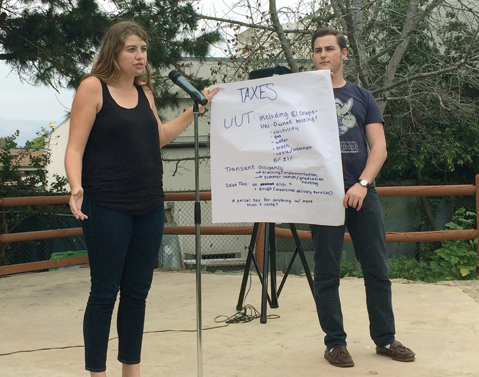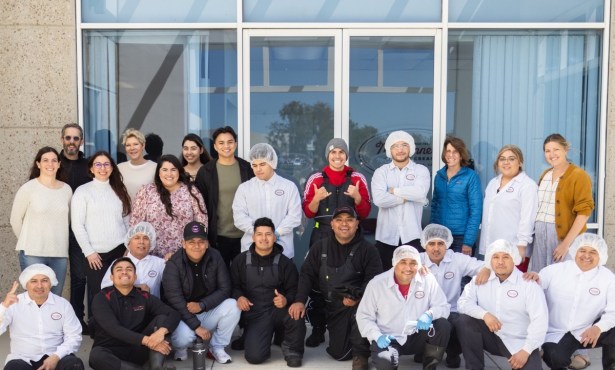Isla Vista: Divide and Conquer?
Opinions Split Over Self-Governance Options

Two different yet complementary efforts are taking place in Isla Vista to clamp down on the rowdy college bubble and give a voice to those inside. The challenge is to develop creative ways to stabilize I.V. while giving residents the power to control their own destiny.
Last week, members of the Local Agency Formation Commission (LAFCO) — made up of city, county, and special district representatives — voted to send a letter of concern to Sacramento regarding Assemblymember Das Williams’s recent effort to establish a watered-down version of cityhood in Isla Vista, commonly referred to as a community service district (CSD). All but two commissioners — Supervisors Doreen Farr and Janet Wolf — agreed that Williams’s bill, AB 3, would wrongly bypass the standard LACFO process.
The letter also asked a series of questions: Which services would be included in the proposed CSD? What would happen to the Isla Vista Recreation & Park District? What would be the roles of UCSB and Santa Barbara City College? Would new taxes be levied?
What’s currently on the table is the shell of a bill outlining a CSD that would be capable of implementing taxes and naming Isla Vista representatives. The tax revenues could enhance existing services, pay for landlord-tenant mediation, create a planning commission, or install additional lighting, among other options. “In my mind, a modest community service district could provide some measure of good services for as little as $4 million to $5 million [annually],” Williams said. The letter is “not the end of the world,” he added.
Since the bill was first introduced in December, the public-input process has been notably energetic, with about 20 students and homeowners attending weekly meetings to discuss improvements in an area spotlighted by recent crimes and civil unrest.
None of the LAFCO commissioners have said they are against creating a CSD, but they contend Williams’s bill seeks to delete the intergovernmental group from the equation. “AB 3 should have never existed. It’s wasted time,” said commissioner and Carpinteria Sanitary District representative Jeff Moorhouse, clarifying that the public meetings are useful because a community group could file an application with LAFCO to start taking the proper steps.
But some activists also argue that LAFCO has done little in the past several decades to help establish a special district in Isla Vista; attempts at cityhood have also failed several times. Plus, they say, Williams’s legislation gives the special district freedom to be more flexible in its choice of representation and taxation than that allowed by the standard LAFCO process.
At a town-hall meeting this Saturday, community members gravitated toward the idea of implementing a utilities users tax (UUT) — like the City of Santa Barbara’s — because renters and owners would both have skin in the game.
Dissenting from the other LAFCO commissioners was Farr, who represents Isla Vista in the county’s 3rd District and who has joined forces with Williams’s office. On Saturday, Farr expressed disappointment over the letter, calling the decision to send it “premature.” She added the latest efforts to wrangle Isla Vista are still in their early stages and said she hopes LAFCO will take another look at its options.
The majority of LAFCO commissioners have also raised their eyebrows at the bill because it is ambiguous and does not spell out how the CSD would operate. “They fear the unknown. That’s understandable,” said Ali Guthy, UCSB student body president. “It’s all up in the air at this point.” But, she added, public conversations are ongoing. “We weren’t telling them not to [send the letter]. We were telling them to wait,” Guthy said. Last week, UCSB Associated Students unanimously voted to support Williams’s measure.
Among the mix of I.V. activists is 33-year-old Jay Freeman — head of the software company SaurikIT, a leader in the jailbreaking world — who has lived on the outskirts of Isla Vista for 15 years and is among the hardcore advocates who champion full-blown cityhood. A city could, for instance, take over police and fire services rather than just augment them as a special district would.
Many remain skeptical that cityhood is viable. Thirteen years ago, a feasibility study completed when Goleta incorporated found that I.V. does not generate enough revenue to become its own city. The Bacara Resort and Camino Real Marketplace — bringing in transient occupancy and sales taxes — are crucial to Goleta’s financial viability.
In the past decade, Isla Vista’s population has increased by several thousand, but without a hotel or large commercial outlets, its revenue remains small. With the potential for extra taxes, Freeman believes cityhood could be viable; he at least wants to verify that it’s not. To that end, he has pledged to spend $70,000 on a financial feasibility study, and this week he filed paperwork for the creation of a nonprofit called I.V. Is a City to collect the funds. “Everyone’s working in the same general direction,” Freeman said, adding he would ultimately support a community service district if cityhood is not achievable.
“There’s this emotional problem of being able to blame other people — partly because it might be correct to blame Goleta, to blame the county, or to blame UCSB for everything,” Freeman went on. “I think it’s really difficult to make progress until it’s not possible to blame anyone.”
Also problematic is that the state dissolved Redevelopment Agencies in 2012, ending the roughly $6 million Isla Vista received annually for enhanced infrastructure — i.e., landscaping down Pardall Road, newer housing, sidewalks, and bus stops.
Currently, Isla Vista property owners pay a special tax based on their property value and number of bedrooms. Bob Geis, county Auditor-Controller, estimated that to be about $150 annually per property.
AB 3 could still involve LAFCO in a variety of ways, and it remains to be seen what the exact bill language will look like. Williams has until March 16 to amend the bill so it can be assigned to a policy committee.
Editor’s Note: This story was changed to reflect Jay Freeman’s correct company name.



